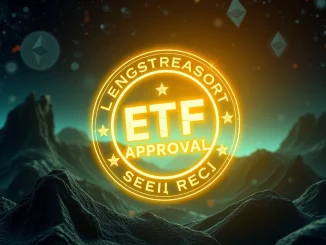
Exciting news is circulating in the crypto investment world! Reports indicate that crypto investment management firm Canary Capital has officially registered a SEI Staking ETF in Delaware, U.S. This development, initially shared by Unfolded on X, suggests active steps are being taken to bring staking yields into traditional financial product wrappers like exchange-traded funds (ETFs). What does this Delaware ETF registration signify, and what could it mean for the future of SEI staking and the broader Crypto ETF landscape?
What is a SEI Staking ETF and Why is it Notable?
To understand the significance of Canary Capital‘s move, let’s break down the core components:
- SEI: Sei is a Layer 1 blockchain specifically designed for trading. It aims to provide a high-performance environment for decentralized exchanges and trading applications.
- Staking: Like many proof-of-stake blockchains, SEI allows token holders to ‘stake’ their SEI tokens. Staking involves locking up tokens to support the network’s security and operations, and in return, stakers can earn rewards (yield) paid out in SEI tokens.
- ETF (Exchange-Traded Fund): An ETF is an investment fund traded on stock exchanges, much like stocks. An ETF holds assets (like stocks, bonds, or commodities) and divides ownership of those assets into shares. ETFs offer investors a way to gain exposure to an asset or strategy without directly owning the underlying asset.
A SEI Staking ETF, therefore, would likely be a fund that holds SEI tokens and potentially engages in staking activities to generate yield. This yield could then be distributed to ETF shareholders, or reinvested. The notable aspect is combining the yield-generating mechanism of staking with the accessible and regulated structure of an ETF.
Why This Delaware ETF Registration Matters for Crypto ETF Aspirations
The news specifically mentions registration in Delaware. Delaware is a popular state for corporate registration in the U.S. Registering an entity or filing initial documents there is often an early step in the process of launching a financial product, but it is crucial to understand what this registration likely is, and what it isn’t:
- An Initial Step: Registering a fund or entity in Delaware is typically a preliminary legal and structural move. It establishes the fund vehicle.
- Not SEC Approval: This registration is distinct from getting approval from the U.S. Securities and Exchange Commission (SEC) to list and trade the ETF on a national exchange. SEC approval involves a separate, rigorous filing and review process (often involving N-1A filings for ETFs).
- Signaling Intent: The fact that Canary Capital is undertaking this registration process signals serious intent to potentially bring a SEI Staking ETF to market. It shows firms are actively working on product structures that incorporate crypto staking.
This Delaware ETF registration is an important indicator of how firms are trying to bridge the gap between the yields available in decentralized finance (DeFi) through activities like staking and the regulated world of traditional finance. It highlights the ongoing effort to package crypto assets and their native yields into familiar investment products for a broader investor base.
Potential Benefits and Challenges of a SEI Staking ETF
Should a SEI Staking ETF eventually receive full regulatory approval and launch, it could offer several potential benefits:
- Accessibility: Easier access for traditional investors who are comfortable with brokerage accounts but less so with managing crypto wallets and staking directly.
- Convenience: The fund handles the complexities of staking, including validator selection, reward claiming, and potential lock-up periods.
- Regulatory Wrapper: An ETF structure provides a layer of regulatory oversight, which can offer investor protections not always present when staking directly on-chain or via unregulated platforms.
- Diversification: Could potentially be part of a diversified investment portfolio within traditional brokerage accounts.
However, challenges exist:
- Regulatory Hurdles: Getting SEC approval for a staking ETF is not guaranteed and could face significant delays or requirements.
- Yield Variability: Staking yields can fluctuate based on network conditions. The ETF’s performance would be tied to this variability.
- Fees: ETFs charge management fees, which would reduce the net yield compared to direct staking.
- Tracking Differences: The ETF’s performance might not perfectly track the direct staking yield due to fees, operational costs, and fund management decisions.
- Market Risk: The primary asset is SEI, and the ETF’s value will be highly correlated with the price volatility of SEI tokens.
What’s Next After Delaware ETF Registration?
The registration in Delaware is just one piece of a complex puzzle. For a SEI Staking ETF to become available to the public, it would need to navigate the U.S. regulatory landscape, primarily with the SEC. This typically involves:
- Filing Registration Statements: Submitting detailed documents (like Form N-1A) to the SEC, outlining the fund’s structure, investment strategy (including staking mechanics), risks, fees, and operations.
- SEC Review and Comments: The SEC staff reviews the filing and typically provides comments or requests for clarification and amendments. This can involve multiple rounds of submissions.
- Potential Regulatory Challenges: Staking involves unique operational and regulatory considerations (e.g., how rewards are treated, custody of staked assets) that the SEC is still evaluating in the context of investment products.
- Approval and Listing: If the SEC is satisfied and declares the registration statement effective, the ETF can then be listed on a national securities exchange.
The timeline for this process can vary significantly, ranging from several months to over a year, especially for novel product types like a staking-focused Crypto ETF.
Conclusion: A Step Towards Broader Crypto Adoption
The registration of a SEI Staking ETF by Canary Capital in Delaware is a significant, albeit early, step in the evolution of crypto investment products in the U.S. It demonstrates that financial firms are actively exploring ways to bring the yield opportunities of activities like SEI staking into regulated, accessible structures. While this Delaware ETF registration is far from a guarantee of launch, it highlights the growing interest and ongoing efforts to integrate blockchain-native activities with traditional finance. Investors and market watchers will be closely following any further filings and regulatory progress regarding this potential new Crypto ETF.



